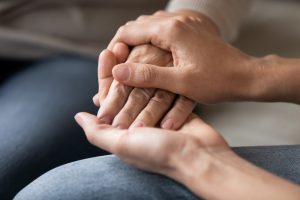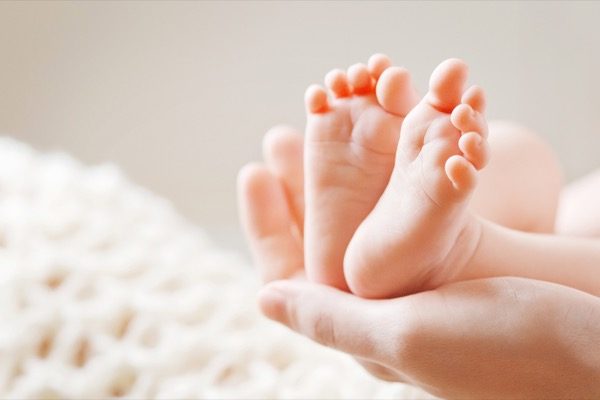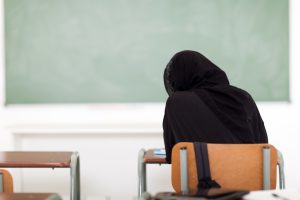
Dr Munazzah Chou, MBBS, MA(Cantab), FRCOphth, is a fourth year Registrar of Ophthalmology (Eye Surgery) at St Thomas’ Hospital, London, one of the top teaching hospitals in the UK. Dr Chou is of Chinese heritage but was born in Faisalabad, Pakistan. She was then raised in Surrey, England, by her family and father, the late and respected Osman Chou, a devoted Imam of the Ahmadiyya Muslim Community. Dr Chou studied Medicine at the prestigious Cambridge University (Newnham College). Its illustrious alumni include the poet, John Milton, the naturalist, Charles Darwin, as well as 71 Nobel Prize winners including the late Dr Abdus Salam (Physics). Dr Chou is now married and blessed with three children and is still based in Farnham, Surrey. The Review of Religions Women’s Section Editor, Munavara Ghauri, had the pleasure to ask Dr Chou about her faith, career and life so far…
MG: Welcome Dr Chou to The Review of Religions Magazine! Thank you so much for sparing some of your valuable time for us out of a very busy schedule.
Dr Chou: Wa Alaikum Salaam (and upon you be peace), Jazak’Allah (may God bless you), it’s a pleasure. When we were children in Islamabad (Surrey) before I could really even read The Review of Religions, we would spend hours packing the magazine individually in envelopes, attaching the address labels and putting them in big grey royal mail sacks for Professor Amtul Majid Chaudhry, who would reward us with bags of treats. We loved doing it!
MG: Ah, so you’ve been working for The Review of Religions longer than I have! How did your interest in medicine and Ophthalmology in particular develop?
Dr Chou: I knew I wanted to do something to help people and my siblings were both in medicine so it felt natural for me to follow them! My parents, in fact, suggested I might consider something else but I wasn’t convinced. I think as a child it’s so easy to equate being a doctor with helping people. I watched a documentary on TV on the ‘Smile train’, a train with an operating theatre which travelled through India operating on facial defects called cleft palates. I remember the voiceover saying that because of this procedure, these children will be accepted by their community, will be able to go to school without being bullied and grow up, find jobs and get married. It was inspiring and I thought, ‘That’s what I want to do.’
So, I always knew I wanted to be a surgeon, and the operation that makes up the bulk of surgery is cataract surgery and this can be totally life-changing. Ophthalmology is fascinating; the way that we are able to see, the design of all the different components in the eye is, subhanAllah a marvel. Very recently I discovered that the science of optics and anatomy of the eye were advanced by a Muslim polymath, Ibn al-Haytham, who drew stunning anatomical diagrams of the eyes and their connection with the brain. Ophthalmology happens to be fascinating, as well as the surgical specialty which is most compatible with a family life.
MG: Indeed, the gift of sight is invaluable and how wonderful to be part of the process of giving it. At what stage of your medical training are you currently?
Dr Chou: I’m currently in my 4th of 7 years of specialty training. I started this after two years of foundation training in general medicine and surgery.
MG: You were raised in rural Surrey, England, where there was little ethnic diversity. How was your childhood as the only Chinese family in your community?
Dr Chou: I grew up in Islamabad (a rural settlement owned by the Ahmadiyya Muslim Community) in Tilford (Surrey), which is a totally unique environment. In Islamabad, the majority of families were Pakistani, and this was set in Tilford, which is a quintessential English village. I felt very much at home in Islamabad and because we spoke Urdu I didn’t really feel any different to anyone else. In many ways, I felt more Pakistani than Chinese. At school, I didn’t notice any difference from my friends but I was aware that we were seen as different when outside. When out with my mum and sister, we would get looks, but I am sure that this was because of my hijab rather than our ethnicity.
MG: You often wear a black hijab or niqab. This kind of dress is sometimes perceived as a symbol of oppression or extremism in Islam. How would you respond to those who allege that you are either oppressed or an extremist?
Dr Chou: I would say that I am neither. It is very unfortunate that this is the perception of a significant section of the population here and things aren’t helped by the regular negative press Muslims get. Wearing the hijab was a choice I made as a teenager, based on my understanding of my religious obligations. It has never prevented me from doing anything that I wished to, although I must have recognised at the time that it would not make my journey any easier, in terms of how the rest of society would judge me. Extremism is something so beyond the pale of Islam that any Muslim who understands even the very basics of faith can’t understand how the two are linked, and as Ahmadi Muslims, we are fortunate to have understood this in depth through the writings of the Promised Messiah (as) and the Khulafa (spiritual successors).
MG: You studied medicine at the prestigious University of Cambridge. They have a collegiate system where a lot of social events are arranged. Did you find such an environment challenging as a Muslim woman who chooses to keep a distance from men socially?
Dr Chou: There were definitely social occasions that I chose not to attend because of purdah (hijab), but this was made easy for me because I attended a female-only College and there were plenty of opportunities to meet people and make friends. So, it wasn’t hugely challenging, Alhamdolillah. I can imagine in a co-ed college this would have made things very difficult.
MG: You are a Muslim of Chinese heritage. In what ways are Islamic values and those of the Chinese culture similar and how are they different?
Dr Chou: One moral value which is greatly emphasised in Chinese culture through the teachings of Confucius, is filial piety. This is equivalent to Islamic teachings of the respect which is due to our parents. I remember being told a story of how in China families sat at the table with food served, but they would not begin until their grandma joined them after her nap. The Holy Qur’an also instructs us to, ‘Show kindness to parents…and lower to them the wing of humility out of tenderness’ [1] and pray for them. Respect for elders and those in authority e.g. teachers, is also an important shared value. In terms of traditional values, I think Chinese values are very similar to Islamic values but these may have become diluted more recently.
MG: That is so interesting. It tallies with the Islamic concept that all religions originally taught the same fundamental values through various prophets that were sent to different lands. For example, in Chapter 16 of the Holy Qur’an Allah Almighty states: ‘We did raise among every people a Messenger with the teaching, ‘Worship Allah and shun the Evil One.’’ [2]
On another topic, you had an arranged marriage. Why did you opt for such a marriage when some would argue that it is an archaic and obsolete system and that contemporary women are quite capable of choosing their own life-partners?
Dr Chou: There is a distinction between an arranged marriage and a forced marriage, and whilst a forced marriage is, of course, cruel and despicable, not to forget unIslamic, an arranged marriage is not too different from the way other relationships begin, through introductions. Women absolutely have the choice, and this right to choose was given to Muslim women over a thousand years ago. In Islamic society, women can be presented with potential partners to consider. My husband also grew up in Islamabad and our fathers had been friends since their time together at Jamia (Islamic theological college) in Pakistan. My brother knew my husband well and they played football together and living so close for so many years we knew the family well. So actually, it wasn’t at all like stepping into the unknown. Even so, a huge decision like marriage is not something entered into lightly and there was a long period of prayers and Istikhara (special prayers offered for decision-making).
MG: You rightly point out that people often think arranged marriages and forced marriages are synonymous.
You currently have three young children and are also undergoing vigorous training as a Specialist Registrar at St Thomas’ Hospital, London. This involves living on-site for calls. How do you manage to fulfil the demands of both your family and your career?
Dr Chou: I’ve been very fortunate Alhamdolillah (all praise belongs to Allah), with family support; both my mother and mother-in-law live with me, and this year my husband has been able to work from home so they are all instrumental in juggling everything from school runs, meals and the children’s religious education. Without them, I wouldn’t be working quite simply. I work part-time so I do three days a week and yes for on-calls I always stay on-site in case there are any emergencies I need to attend to immediately. But these are infrequent – about one night every 2 or 3 weeks and with two grandmas and dad at home I am happy that my children are well-looked after.
MG: It sounds like you have a strong family network at home and are very fortunate. How has the last year been for you, working in a busy hospital in the midst of the COVID-19 pandemic? Have you been concerned for your own safety?
Dr Chou: The hospital has been great at getting us the right PPE so it hasn’t been too much of a concern in the eye department. The main concern really was taking something home with me to my family and my mother and mother-in-law, but Alhamdolillah we have all been well throughout. At some point, it seemed imminent that I would be deployed to ITU and I started making plans for living away from home, but it didn’t come to that.
MG: I’m glad to hear your family has remained safe and well during the past year.
Your father, the late, respected Osman Chou, was an Imam for the Ahmadiyya Muslim Community. How did his vocation impact your life?

Dr Chou: My father’s outlook on life and his purpose was singular; devotion for him was a way of life. There was no such thing as relaxation time. For my father, relaxation would be having time to contemplate on the Divine attributes or having time to read. He would say that life is not about enjoyment but that everything we do should be worship, even eating if we do that with the right intention – which was to stay healthy and do more good work. We grew up with an expectation that we would achieve academically and go on to serve others but not just as doctors. Being a doctor might simply afford us opportunities to spread the message of Ahmadiyyat to the Chinese people.
Fundamentally, my life would be unimaginable and unrecognisable if my father wasn’t an Imam. I wouldn’t be witness to countless blessings. I have only to compare myself with my relatives in China to know what blessings devotion to the Jama’at (Ahmadiyya Muslim Community) and Islam has brought, spiritually as well as in terms of education and opportunities.
MG: Your late father was a truly inspirational individual! May Allah elevate his soul in Paradise.
Our Community (the Ahmadiyya Muslim Association) is involved in many charitable projects. For example, our international charity, Humanity First, has provided cataract operations to 20,000 people in various countries. Does this sort of humanitarian work appeal to you?
Dr Chou: Absolutely, I want to be out there serving in the field once I am fully qualified and my children are a little older. I have been helping in any small way I can and there is an exciting hospital project underway in Burkina Faso where the Jama’at (Community) is building a modern, fully equipped eye hospital with surgical facilities. Humanitarian work is why I wanted to be a medic.
MG: Finally, do you have any advice for young women who are currently considering careers in medicine in the UK?
Dr Chou Medicine is definitely a worthwhile vocation and is hugely fulfilling. If you have good grades and you think you’re interested, then there is no reason to not consider it. In fact, women now outnumber men at medical schools. It is a long training programme but there is no rush to get to the end of it once you’ve completed medical school. Part-time training is common and if you don’t want an office job, because like me you’d fall asleep at your desk, then it’s definitely worth considering. Medicine is so broad that there will always be a specialty that suits every personality type.
I think it’s also important to realise that everyone has setbacks. I have had many from the very beginning of my medical education. But Insha’Allah (God-willing) these can be overcome and the potential for making a difference is wide open.
MG: Thank you Dr Chou for sharing some of your values and life experiences with us. We wish you the best of luck and every success in your future career!
ENDNOTES
[1] The Holy Qur’an Ch.17 V24-5
[2] The Holy Qur’an Ch.16 V37




Add Comment